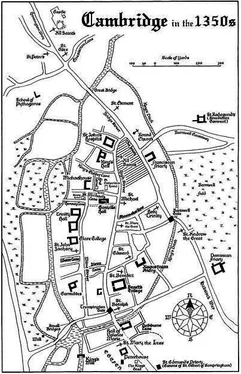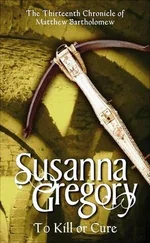‘Who is he?’ asked Bartholomew, wondering whether Cynric had started his Christmas celebrations early, and had been at the ale. ‘Do I know him?’
‘Sir Walter Turke,’ said Cynric. ‘I do not believe that you have met.’
The name meant nothing to Bartholomew. ‘Why are you telling me all this?’ he asked.
‘You knew Turke’s wife during the pestilence,’ replied Cynric uneasily. ‘She had the disease, but survived.’
‘There were not many of those,’ said Michael, unnecessarily unkind. ‘This woman should come leaping to your mind.’
But she did not, and Bartholomew gazed blankly at Cynric, searching the half-forgotten faces in his memory for a woman who had married a fellow called Turke. He tended to suppress thoughts of those black, dismal days, when his painstakingly acquired skills and experience were useless in the face of the wave of sickness that swamped most of the civilised world, and nothing came to him.
‘Actually,’ said Cynric, speaking reluctantly when he saw Bartholomew was not going to guess who he meant. ‘You were betrothed to her yourself. But after the Death, she went to London and wed Sir Walter Turke instead. Her name was Philippa Abigny.’
His message delivered, Cynric escaped to his other duties with obvious relief. A private man himself, he disliked witnessing the rawer emotions of others, and he had had no idea how the physician might react to the news. He need not have worried. Bartholomew did not react at all, too startled by the sudden incursion of his past into the present to know what he thought about the prospect of the beautiful Philippa Abigny touching his life again.
‘Philippa Abigny,’ echoed Michael in astonishment, watching Cynric all but run in the direction of the kitchen before Bartholomew or Michael could question him further. ‘I did not think she would ever show her face here again. What she did to you was not right.’
‘You mean because she broke our betrothal to marry someone richer?’ asked Bartholomew. ‘Perhaps it was for the best. Who knows whether we could have been happy with each other?’
‘You can probably say that about most things,’ said Michael philosophically. ‘But she was wrong to abandon you so abruptly. You could have applied to the Pope to have her marriage annulled, you know. You would have been within your rights, given that your betrothal had been of several years’ duration.’
‘But then I would have had to marry her,’ Bartholomew pointed out. ‘And I am not sure that is what I wanted.’
Michael chuckled. ‘You prefer the lovely Matilde these days, I suppose. Well, whatever you think, it will be interesting to see Philippa again and to assess what you have missed by allowing her to slip through your fingers.’
Bartholomew nodded absently. He stood in the middle of Michaelhouse’s yard, with Michael sniggering lustfully beside him, and wondered how the sudden and unexpected arrival of someone who had played such an important part in his past would affect his future.
Bartholomew woke in an uneasy mood the next morning, with Philippa Abigny at the forefront of his thoughts. It was the last day of Advent – the period of fasting and prayer before Christmas – and the time when people readied themselves for Christmas. Long before dawn, Michaelhouse buzzed with activity. Servants scurried here and there, carrying pots, pans and supplies of various kinds, watched over by the critical, all-seeing eyes of that most illustrious and feared of College servants, Agatha the laundress.
Women were rarely employed by the University, because it was a domain inhabited by men, many of whom had taken priestly vows of celibacy. In order to avoid unnecessary temptation, the University ensured that contact between scholars and ladies was minimal, and its beadles patrolled assiduously, aiming to prevent long-deprived students from straying to taverns or other town venues where they might encounter members of the opposite sex.
Laundresses, however, were a necessity, and to surmount the problem, the University stipulated that any ladies hired should be so physically unattractive that they would repel even the most desperate of scholars. Ugly, but competent, washer-women were highly prized commodities, and Colleges and hostels guarded them jealously. Michaelhouse had Agatha, a mountain of a lady with a bristly chin, powerful arms, mighty hips and an unshakeable conviction that she had survived the plague because she was a favourite of God’s. She took her College duties seriously, and, as the Twelve Days approached, no member of Michaelhouse could expect to find himself exempt from running her errands or from becoming embroiled in her frenzied arrangements.
The scholars left the early-morning chaos and attended mass. On the way back Michael fretted that the fuss was likely to mean a delayed breakfast, but he had underestimated Agatha, who was quite capable of producing meals and overseeing festive preparations at the same time. The undercook rang the bell to announce the beginning of breakfast at precisely seven o’clock, just as Master Langelee was leading his scholars through the gate into Michaelhouse’s yard.
When the College had been founded in 1324, no expense had been spared by Hervey de Stanton in establishing the institution that he hoped would pray for his soul in perpetuity. It comprised a pair of accommodation wings, each two storeys high, linked by a central hall. Below the hall were kitchens and a selection of storerooms and pantries. The servants’ wing stood behind these, along with outbuildings that included a barn, a brewery, a bakery and a series of sheds that were used for storage. Thirty years had taken their toll, however, and some of the once fine buildings were in dire need of repair. The north wing, where Bartholomew lived, had a leaking roof and faulty guttering, so that students and their masters were regularly doused with icy water in wet weather, and the walls were so slick with damp that mould marched up them in thick green columns.
While Bartholomew studied some loose tiles on the stable roof, Michael headed for the hall, his eyes fixed unblinkingly on the door beyond which his breakfast was waiting. He was not happy to find his progress interrupted by the appearance of Beadle Meadowman. Meadowman was looking flustered. In one hand he held the arm of a student, while the other gripped a smirking woman. The woman was called Una, and she was one of the town’s prostitutes, while the student was one of Bartholomew’s aspiring physicians. Bartholomew regarded the lad with weary resignation. Martyn de Quenhyth was always in some kind of trouble, although the physician thought that even dealing with Quenhyth’s silly scrapes was preferable to dwelling on his impending encounter with Philippa.
Quenhyth had arrived in Cambridge the previous September, determined to become a physician. Langelee had accepted him at Michaelhouse because he was able to pay the requisite fees, but Bartholomew had been less than impressed, and found Quenhyth arrogant, intense and joyless. The lad was no more popular with his fellow students, and was constantly the butt of their practical jokes. Bartholomew suspected that the teasing would stop if Quenhyth made an effort to be pleasant, but Quenhyth was just not the pleasant type.
He was tall and gangly, with long, ink-stained fingers that were tipped with gnawed nails. A thatch of brown curls had been hacked with a knife to reduce it to the length required of scholars, and his uniform was worn exactly according to the College’s prescription. He possessed a mean, thin nose and a pair of pallid eyes that he turned accusingly on a group of his classmates, who just happened to have gathered nearby to study a psalter – something that immediately aroused Bartholomew’s suspicions. He guessed they had adroitly manoeuvred themselves into a position where they would be able to hear what was happening. Among them were Sam Gray, a bright student with a cruel sense of humour, and Rob Deynman, a dull-witted lad who was tolerated at Michaelhouse because his wealthy father paid double fees.
Читать дальше












